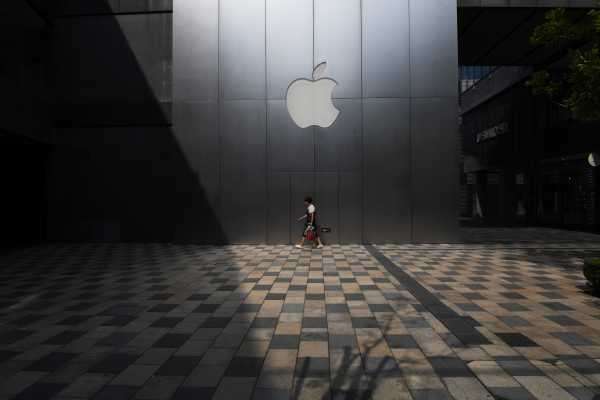
This story is part of a group of stories called

Uncovering and explaining how our digital world is changing — and changing us.

Apple’s App Store war against developers — and its ongoing antitrust issues — appear to be coming to a head.
Epic Games, the creator of hugely popular game Fortnite, is suing the company, claiming that its App Store practices violate the Sherman Act. Epic says that Apple’s requirement that all mobile apps come through its App Store (and the 30 percent commission Apple charges for app sales and in-app purchases) is a monopoly, and that Epic — as well as its fellow developers and their customers — should have alternatives.
Apple, a $2 trillion company, has not only refused to consider changing its lucrative business model, but it’s also kicked Fortnite out of the App Store. And now Apple is threatening to cut off Epic’s access to its developer tools program, which could affect any apps that use the company’s Unreal Engine — and therefore, any consumers who use those apps.
As Recode’s Peter Kafka explained last week, apps on Apple mobile devices have to go through the company’s App Store, which charges a 30 percent commission for app purchases as well as any purchases made within the app itself. As a “freemium” game, Fortnite makes all of its money through in-app purchases of its virtual currency, and Apple gets a cut of that. When Epic attempted to get around this by offering customers the option of purchasing Fortnite currency directly from Epic at a discount, Apple kicked Fortnite out of the store for violating its terms of service. Epic responded with a lawsuit, joining an ever-louder chorus of developers and legislators who have accused the App Store of monopolistic practices, given its total control over the apps offered on its devices.
The outcome of all this could significantly change the app ecosystem Apple helped create, possibly to developers’ and consumers’ benefits. Right now, however, everyone is losing.
The App Store can be mutually beneficial to Apple and app developers
When the App Store launched on iPhones in 2008, it was pitched as a win-win. Developers would have easy access to Apple users as well as tools to create and sell the apps they made — all of which was especially good for small developers that didn’t have the resources to do so otherwise. In return, Apple would get a rapidly expanding roster of apps to offer its consumers, and a steady stream of cash from commissions it took off the purchase price of paid app as well as in-app purchases. This concept has largely been a success. The App Store now offers millions of apps, and Apple says that in 2019 alone it generated more than $500 billion, most of which was not subject to the 30 percent commission Apple takes off in-app purchases and paid apps.
Because the App Store is the only way consumers can get apps on their iOS devices, Apple has been able to make whatever rules and set whatever prices it wants around all app purchases. App developers, therefore, have to agree to them or else lose their access to hundreds of millions of potential customers. For years, developers have complained about this, but they’ve had little recourse. As Epic recently found out, if you break the rules, you get banned.
Developers have also accused Apple of using inside knowledge about which apps do well to inform its own decisions about which native apps to develop. Many those Apple-made apps come preloaded on iOS devices and can’t be deleted, and they’re pushed to customers in a way that third-party versions are not. Apple also gives its native apps access to certain features, like Siri, that third-party apps don’t have, although the company has recently made efforts to give third-party apps that access.
These complaints, brewing for years, are now coming to the forefront as a handful of major developers protest against the perceived monopoly.
Developers are fighting back
Epic is not the first, and is far from the only company to complain about the App Store. Spotify has been especially vocal. The Sweden-based music streaming platform filed an antitrust complaint with the European Commission in March 2019, saying it was forced to increase subscription rates for in-app subscriptions to make up for Apple’s fee. (Subscription services like Spotify are charged a 30 percent commission for their first year, after which it’s 15 percent.) Spotify has also claimed that Apple made its own rival streaming music service, Apple Music, after seeing Spotify’s success on its platform.
Prompted by Spotify’s complaint, the European Commission announced in June 2020 that it was investigating Apple for antitrust violations. If the company is found to have violated the EC’s antitrust rules, consequences for Apple could be severe: a fine of up to 10 percent of the company’s annual revenue.
There have been legal issues in the United States, too. A few months after Spotify’s complaint in June 2019, American developers sued Apple, saying its rules and the lack of an app store alternative gave the company an unfair monopoly and drove up prices. This is after the Supreme Court ruling in May 2019 gave the green light to a class action lawsuit from iPhone owners accusing Apple’s App Store of violating antitrust laws. If Apple loses the lawsuit — or decides to settle — the company could be on the hook for a massive payout to millions of App Store customers. Apple may also decide to change its App Store policies to avoid more lawsuits and payouts.
As for Epic, it has long been a critic of app store commissions in general. The company even refused to offer Fortnite in Google’s Play store until April 2020, but because Android doesn’t force users to get apps through that store, Android users could still get the game. This wasn’t possible for its Apple customers, and Fortnite has been in the App Store since 2018. According to the Wall Street Journal, the game has been downloaded on more than 130 million Apple devices and generated $1.2 billion in App Store spending — a nice tidy of sum for Epic and Apple, but apparently not enough for Epic.
Last week, Epic basically dared Apple and Google to ban Fortnite from their stores by offering users the option to purchase virtual currency from Epic within the app, violating both companies’ rules. Both companies responded by banning Fortnite. Epic responded by suing both companies. It’s also mobilized its user base on social media, releasing a cheeky video and encouraging its users to share the hashtag #FreeFortnite.
Following the Epic lawsuit, Facebook — which has its own antitrust issue — jumped on the bandwagon, claiming that the Apple tax will harm the pages and businesses using Facebook’s new paid events feature. Facebook is urging Apple to temporarily waive its commission, as Facebook is waiving its own commissions on the new feature for a year, giving any and all paid events proceeds to the pages that offer them. The social media giant framed this as a way to help businesses struggling during the Covid-19 pandemic, and as a result, Apple’s refusal to waive the fee could be seen as harmful to those businesses.
The App Store advantage
Apple claims that the 30 percent App Store commission helps pay for the costs it incurs to host the apps. This includes a peace of mind, as requiring consumers to download apps directly from the App Store helps the company ensure they meet certain standards and are secure — which is especially important when it comes to things like credit card information.
The origins of the 30 percent cut are from the cut that Apple took from iTunes sales — between 30 and 40 percent per track. Back when the App Store was introduced, then-CEO Steve Jobs said the 30 percent commission was needed to “pay for running the store,” and that Apple didn’t “intend to make any money” from it. That may have been true in 2008 when the App Store launched with a few hundred apps, but Apple now makes billions from App Store commissions every year.
Apple also maintains that the vast majority of App Store apps are free, which means most of the apps benefit from the App Store ecosystem while giving Apple nothing in return. Free apps usually make their money from ads and by selling their data to third parties, which Apple doesn’t get a cut of. Apple has also pointed out in a recent study it commissioned that its commission is on par with the rest of the industry. But this ignores the fact that the industry was created by Apple in the first place, and other app stores followed its lead when setting their own commissions.
What this means for customers
So, what does this all mean for you, the App Store customer? Right now, it means you can’t download Fortnite or, if you already have it, you can’t download updates. You may also be paying inflated prices for paid apps and in-app purchases that were set so developers could account for that 30 percent commission. As some developers have decided to forgo in-app purchases entirely to avoid paying Apple a commission, you might have taken the extra step of paying for app subscriptions on developers’ websites rather than through the apps themselves. Apple allows this for so-called “reader apps” like Spotify and Netflix, but Fortnite does not qualify. Apple’s rules also don’t make it easy for customers to figure out how to do this:
As evidenced by Fortnite’s removal from its store, Apple is now digging in its heels and defending these policies. But the company has given in on occasion — for instance, by allowing “premium” video providers like Amazon Prime Video to use their own payment systems for in-app purchases and avoid the 30 percent commission. (In remains to be seen if providers like Disney, which is set to debut its “Premier Access” for Disney+ subscribers on September 4 with a $29.99 Mulan rental, will qualify for this, or if it will be forced to either pay the commission or go the Spotify route to circumvent in-app purchases.)
In a slight relaxing of the status quo, the upcoming iOS 14 will allow users to set third-party apps as their default email and web browsing apps for the first time. But these concessions have also fueled developer complaints that Apple’s guidelines are arbitrarily enforced and preference is given to some companies over others.
None of this is a good look for Apple as antitrust investigations into it, both in the United States and abroad, heat up. Sen. Elizabeth Warren has helped lead this charge, saying in March 2019 that Apple should have to choose between selling apps and offering an app store. To do both gives the company an unfair advantage over its competitors.
“Apple and Google have bullied competitors who need their platform just to exist, all while favoring their own products and services,” Warren told Recode. “If we let companies act as both the umpire and one of the teams competing, they will continue to rig the game in their favor.”
In January 2020, CEOs from a few smaller companies testified before the House antitrust subcommittee about how tech giants, including Apple, have so much control and power that they usually own the market and offer their own products in it, making it impossible for other companies to compete.
“After years of living in fear, more companies and small businesses are beginning to speak out about the monopoly power of the tech giants,” Stacy Mitchell, the co-director of the Institute for Local Self-Reliance and well-known thorn in Big Tech’s side, told Recode. “The tech platforms are a major threat to innovation and entrepreneurship. Developers and small firms are starting to tell their stories — and more than just about anything else, that’s driving momentum in Congress, and it’s making it clear how much the antitrust agencies have to do to make up for lost time.”
One way Apple could possibly avoid antitrust regulation — and satisfy Epic Games — is by allowing its mobile devices to obtain apps outside of the App Store, like Android does. This could give more money to developers and allow them to charge users less. But it also introduces new risks to the users if alternate app stores don’t have the same security standards as Apple or its in-app purchasing system.
Consumers trust Apple, and it has a track record to back that up. Apple apps don’t have nearly as many security and malware issues that Android apps do. Part of the reason that Apple’s security reputation is much better is because the company strives to control every aspect of its devices, including the apps and security measures they’re forced to put in place. Consumers pay a premium for this, and so do developers.
There’s also the possibility that Apple will be able to and insist on continuing to operate as normal. Developers will have to decide if the Apple tax is worth the access to Apple’s consumers. If enough of them remove their apps from the store, consumers may well decide to purchase a device with a different operating system that gives them access to the apps the App Store doesn’t. If they stay, Apple’s large cut may mean less money to the developer that would go toward improving existing apps or creating more, or that customers are paying more than they otherwise would if the App Store had some competition.
Apple, which once dealt primarily in goods, is increasingly becoming a services company — which means its income is also increasingly coming from those services, rather than sales. Cutting off some of that income, either by giving developers an app store alternative or lowering the commission, will likely force the company to make that money up some other way. And the customer always pays for that, one way or the other.
Open Sourced is made possible by Omidyar Network. All Open Sourced content is editorially independent and produced by our journalists.
Will you become our 20,000th supporter? When the economy took a downturn in the spring and we started asking readers for financial contributions, we weren’t sure how it would go. Today, we’re humbled to say that nearly 20,000 people have chipped in. The reason is both lovely and surprising: Readers told us that they contribute both because they value explanation and because they value that other people can access it, too. We have always believed that explanatory journalism is vital for a functioning democracy. That’s never been more important than today, during a public health crisis, racial justice protests, a recession, and a presidential election. But our distinctive explanatory journalism is expensive, and advertising alone won’t let us keep creating it at the quality and volume this moment requires. Your financial contribution will not constitute a donation, but it will help keep Vox free for all. Contribute today from as little as $3.
Sourse: vox.com





